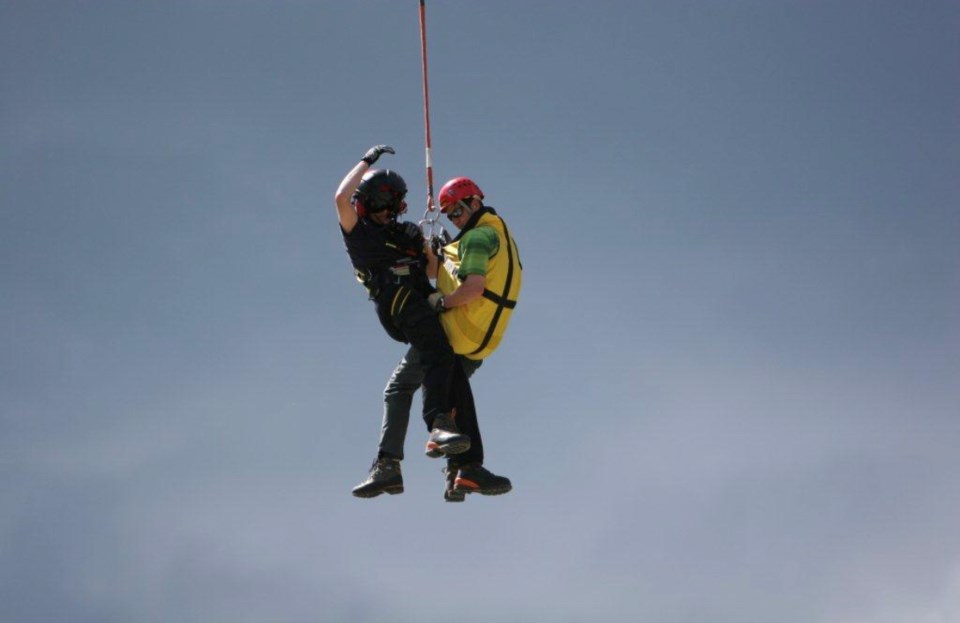Each time a search-and-rescue operation makes its way into the headlines—for example, when Whistler Search and Rescue (WSAR) responded to four separate callouts in a single day earlier this March—a handful of social media users will inevitably leave comments asking a variation of the same question: "Who's paying for it?"
In British Columbia, that's never the search subject, no matter how individuals or groups found themselves in need of assistance. It is the case not just in B.C., but across all Canadian provinces.
Whenever rumours arise that B.C. could consider charging search-and-rescue fees, “it causes us grief,” said Dwight Yochim, CEO of the British Columbia Search and Rescue Association (BCSARA). The organization advocates on behalf of the province’s 78 different ground search-and-rescue groups and their more than 3,400 highly-trained volunteers.
“What happens is someone goes missing; they don't tell anyone. Even if they have cellphone contact, they call their friends and their friends won't call 911, they'll try and go out and do the rescue themselves because they're afraid of the bill they might get,” he explained. “It just delays us, and potentially means, rather than one subject, we now have several."
Or, “Imagine if there was a risk of being charged for a house fire,” Yochim analogized, “so someone tries to put out their house fire with a garden hose, and it catches the next house on fire and eventually the fire department has to show up. It's the same thing. These are first responders.”
The sooner the call, the quicker the response, and the better the chance of a positive outcome, Yochim said. “The kind of society we have is we respond to people in need, and we don't question it,” he explained. “That's the position BCSARA has taken; that that's the way we should do it to reduce risk.”
Still, that's no excuse to venture out into the great outdoors unequipped.
"Could people be more prepared? Absolutely," said Yochim. BCSARA stats show about half of rescue subjects suffered an injury, he added, while the majority of the other half reach out for help after getting lost or stuck.
In many cases, "They didn't bring a map with them. They didn't check the weather conditions. They didn't check avalanche conditions, or they didn't bring a flashlight or bring up the essentials with them," Yochim explained. Even something as seemingly minor as wearing appropriate footwear on a hike could help prevent leg or ankle injuries, he said.
"Those are things that could be done to prevent callouts," Yochim added. "It would be nice to give Whistler and other teams a break and and have a couple of weekends with no calls. And that could happen if those that are enjoying B.C.'s outdoors prepare a little bit better."
How much taxpayer money goes towards B.C. search-and-rescue groups?
In 2022, the province of British Columbia provided a total of $5,961,000 in funding for search and rescue. Of that, $4,918,750 flowed directly to ground search-and-rescue organizations across the province, while the remaining $1,042,250 went towards BCSARA and its initiatives. The B.C. government also foots the bill for any costs incurred during a search-and-rescue operation, whether that be food, helicopter fuel, damaged equipment or other expenses. In 2018, BCSARA estimated an approximate annual cost of $12 million to fund all 78 groups. Taxpayer money "covers about 50 per cent of the costs for them to be task ready," Yochim said.
Approximately $72,000 in provincial funding was directed to the team in Whistler last year, helping pay for members' training and for specialty technical rescue gear, said WSAR manager Brad Sills. That represented a 17-per-cent drop in provincial funding from 2021, when WSAR received roughly $87,000 from Victoria. The 2022 funds were anticipated to cover about a fifth of WSAR’s annual costs, Sills told Pique last June.
Crews like WSAR are registered non-profits that use donations to make up the balance; paying for training and equipment costs. Aside from WSAR’s annual “Wine'd Up” fundraising event—the 2022 edition last November raised a record-breaking $120,000—some donations come from grateful search subjects who found themselves on the receiving end of volunteers’ services.
“Sometimes you'll save a subject and you'll get a ‘thanks,’ which is really all that the volunteers ask for, but sometimes the subjects will come back in to provide a donation or help with fundraising—the support is quite nice,” Yochim said.
On a province-wide scale, search-and-rescue volunteers responded to approximately 1,500 calls in 2022—down from the about 2000 responses conducted during the first year of the pandemic, said Yochim—and put in more than 440,000 volunteer hours.
“For every hour that Whistler [SAR] is out on a search, they've put in almost four hours in training and administrative work,” he estimated.






